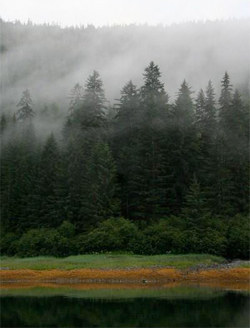|
|
A forest activist group has called out Greenpeace on its support of Kimberly-Clark’s new fiber-sourcing policy.
Ecological Internet, a campaign group run by forest activist Glenn Barry, says that Greenpeace is implicitly condoning the logging of old-growth boreal forests in Canada by supporting Kimberly-Clark’s decision to use wood fiber certified by the Forest Stewardship Council (FSC), a standard that aims to ensure the sustainable use of forest resources. FSC certification has recently been criticized by some environmental groups who say it doesn’t do enough to protect primary forests.
Greenpeace says Kimberly-Clark’s new policy is a step in the right direction “because it immediately protects areas of ancient forest and will protect much more over time.”
But Barry says the policy will allow Kimberly-Clark’s suppliers to continue harvesting timber from ancient forests.

A study published yesterday in Trends in Ecology and Evolution reported that boreal forests are fast being degraded by logging, fires, and the effects of climate change. |
“Any area of ancient boreal forest is still eligible… for first time industrial clearcut if it is ‘certified’ by the forest stewardship council or one of four weaker standards allowed under the agreement,” he writes. “Nothing is assuredly, explicitly protected under this agreement.”
“No one in the [FSC] will release how much of its certified timber and pulp comes from first time logging of ancient forests.”
Kimberly-Clark’s new sourcing policy
Kimberly-Clark pledged last week to establish a moratorium on fiber produced from the “most ecologically sensitive forests areas”, including “Endangered Forests” and “High Conservation Value Forest areas mapped as no-harvest zones” according to Greenpeace. The paper products firm also agreed not to source fiber from primary tropical rainforests and said it would increase the amount of recycled fiber used in its products. Kimberly-Clark’s commitment came after a five-year Greenpeace campaign against the company.
Ecological Internet vs. Greenpeace
Related articles
Boreal forests in wealthy countries being rapidly destroyed
(08/12/2009) Boreal forests in some of the world’s wealthiest countries are being rapidly destroyed by human activities — including mining, logging, and purposely-set fires — report researchers writing in Trends in Ecology and Evolution.
Kimberly-Clark announces greener wood fiber sourcing, sparking debate between environmentalists
(08/06/2009) Kimberly-Clark Corporation, the maker of Kleenex, Scott and Cottonelle brands, has announced stronger fiber sourcing standards that will reduce the company’s impact on forests worldwide. The move comes in response to a long campaign by Greenpeace, an environmental group that is now advising Kimberly-Clark on its forest policy.
Forest certification system needs reform to ensure sustainability – report
(11/04/2008) Demand for wood products is ultimately one of the largest drivers of global deforestation through both direct clear-cutting and selective logging, which increases a forest’s vulnerability to fire and subsequent clearing and disturbance by other actors, including hunters, subsistence farmers, land speculators, ranchers and agro-industrial firms. Reducing the detrimental environmental impacts of meeting wood demand is critical to protecting the world’s forests as healthy, productive and resilient ecosystems.
Rainforest Action Network to review support for FSC certification
(10/16/2008) The Rainforest Action Network (RAN) said it would review its support for the Forest Stewardship Council (FSC), a forest products certification standard, over concerns regarding its certification of destructive logging operations. The announcement comes after a bitter campaign waged against RAN by Ecological Internet, a forest activist group.
The FSC is the ‘Enron of forestry’ says rainforest activist
(04/17/2008) On April 7th, Mongabay printed an interview with FSC International Communications Manager, Nina Haase, in which she defended the FSC against criticism leveled at it by various environmental organizations, such as The World Rainforest Movement and Ecological Internet. The interview drew strong reactions on both sides, and Simon Counsell, director of the Rainforest Foundation UK, requested a chance to respond to the FSC’s interview in-depth. In his response, he states that the FSC has created a “‘race to the bottom’ of certification standards”, alleging that the “FSC really has become the ‘Enron of forestry'”.
The FSC responds to its critics
(04/07/2008) Last month, Mongabay.com reported on recent and various criticisms of the FSC (the Forest Stewardship Council). The FSC is an international organization that certifies forest products which, according to their standards, have been harvested in an environmentally-sustainable and socially-responsible manner. Response to the article was significant. It was picked up by the Ecological Internet’s email campaign and was mentioned on numerous environmental web sites and blogs. At the time of the publication, the FSC had not responded to requests for comments. But in the following interview, FSC International Communications Manager Nina Haase answers each criticism separately and addresses several other issues, such as the FSC and climate change, the organization’s monitoring capabilities, and its adaptation to new environmental concerns. Ultimately she responds to the big question raised by critics: is the FSC stamp still credible?
FSC has ‘failed the world’s forests’ say critics
(03/26/2008) The Forest Stewardship Council (FSC) has come under increasingly harsh criticisms from a variety of environmental organizations. The FSC is an international not-for-profit organization that certifies wood products: its stamp of approval is meant to create confidence that the wood was harvested in an environmentally-sustainable and socially-responsible manner. For years the FSC stamp has been imperative for concerned consumers in purchasing wood products. Yet amid growing troubles for the FSC, recent attacks from environmental organizations like World Rainforest Movement and Ecological Internet are putting the organization’s credibility into question.